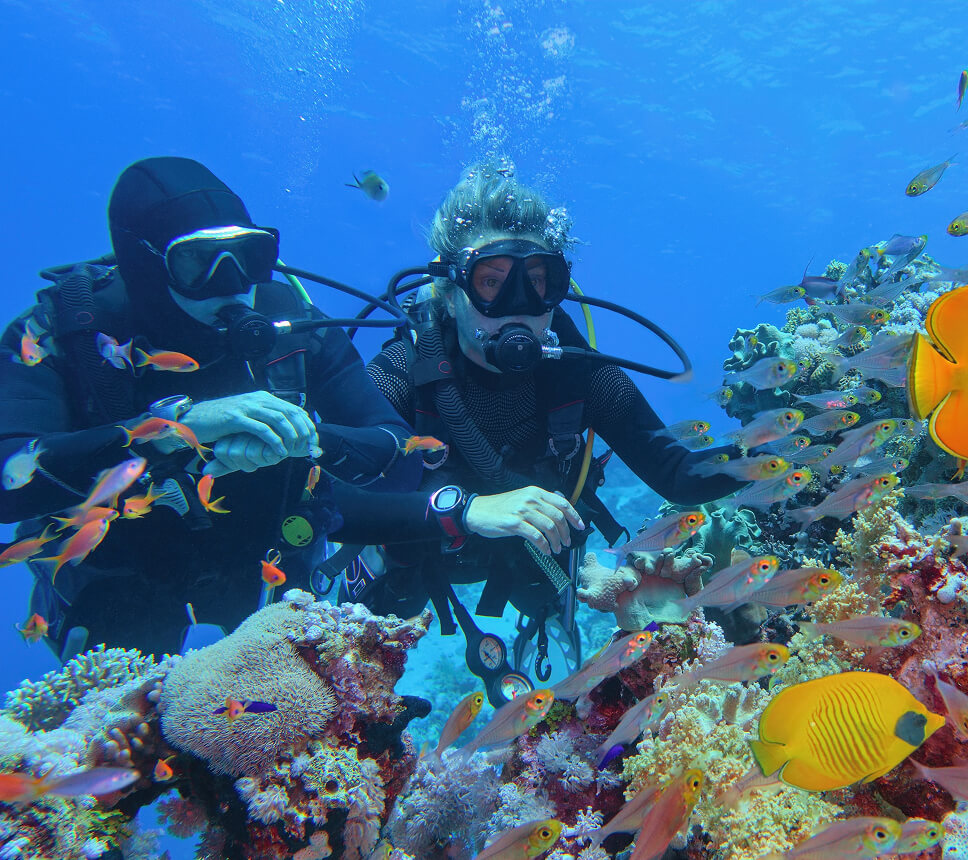Best Scuba Diving Insurance Plans
Several travel insurance plans stand out for their comprehensive coverage designed specifically for underwater adventures. These plans offer protection for extreme sports activities, strong medical and evacuation benefits, as well as competitive pricing.
See a complete breakdown of these plans and more in our full review of the Best Adventure Travel Insurance Companies of 2025.
What Is Scuba Diving Insurance?
Whether you’re a new or experienced diver, there’s always risk involved when exploring the open waters. Scuba diving insurance is a type of travel insurance coverage that can provide peace of mind and financial protection in the event your dive trip takes an unexpected turn for the worse
While not typically a requirement, purchasing travel insurance ahead of a scuba diving trip is highly recommended by tour operators, professional divers, PADI, and other regulating bodies. Policies can vary in cost and coverage, making it easy to find one that fits your budget and travel needs.
What Does Scuba Diving Insurance Cover?

Scuba diving insurance is designed to protect you financially if unforeseen events disrupt your travel plans. Travel insurance plans that cover scuba diving may provide reimbursement for the following scenarios:
- Medical expenses, including treatment for decompression sickness in a hyperbaric chamber
- Medical evacuations and repatriation of remains
- Lost, damaged, delayed, or stolen diving equipment, including masks and dive watches
- Trip cancellations and interruptions
- Significant delays and missed connections
Do All Travel Insurance Policies Cover Scuba Diving?

No, not all travel insurance policies provide coverage to scuba divers. In fact, most standard travel insurance, medical insurance, and credit card insurance plans have exclusions for travelers that suffer loss while scuba diving or participating in other adventure sports during a trip.
With that said, many travel insurance companies now offer adventure policies designed specifically for scuba divers and other thrill-seeking travelers. Use the button below to begin comparing adventure plans from top-rated insurance providers.
To see exact pricing for your trip, try our travel insurance comparison tool. Simply enter your trip details to see all available plans and prices. Start a Quote
Top Scuba Diving Insurance Benefits
Extends insurance coverage to travelers who suffer financial loss as a result of participating in an adventure sport or activity.
Covers unforeseen medical expenses, such as hospital bills, ambulance rides, doctor visits, and more.
Covers the cost of replacing diving gear or other gear that was lost, damaged, or stolen during a covered trip.
Provides reimbursement for prepaid, non-refundable trip costs if you’re forced to cancel your trip for a covered reason.
Provides reimbursement for prepaid, non-refundable trip costs if you’re forced to cancel your trip for a covered reason.
Covers the cost of an emergency medical evacuation to the nearest adequate medical facility or back home.
Browse Other Policy Types
Scuba Diving Insurance FAQs
No, most primary health insurance plans, such as Medicare or an employer-sponsored policy, will not provide coverage for dive accidents that occur while traveling, especially if you’re planning a trip outside the USA.
If you want overseas medical coverage and plan on scuba diving, snorkeling, or participating in any other commonly excluded activity, we recommend finding third-party trip insurance from a reputable provider.
Not all dive-related expenses or disruptions are eligible for coverage through your travel insurance policy. Most travel insurance providers will list specific exclusions in their Certificate of Insurance.
In general, the following exclusions typically apply to dive travel:
- Dive accidents that occur past a policy’s maximum depth limit (i.e., 20 meters)
- Dive trips that are not led by a certified dive master
- Medical care for pre-existing medical condition flare-ups, unless stated otherwise
- Scuba divers who are do not hold an active PADI license
- Cancellations or interruptions relating to known or foreseeable events
Yes, some annual travel insurance policies, also known as multi-trip plans, can provide coverage for scuba divers. This type of coverage can be a cost-effective solution for divers who plan to take at least three trips within a 12-month period.
Similar to short-term single-trip insurance, a policy must include specific benefits and policy wording for coverage to apply to scuba diving. Be sure to read a plan’s fine print of your annual plan’s Certificate of Insurance to ensure your itinerary is protected.
No, PADI (Professional Association of Diving Instructors), a worldwide diving organization, does not offer or sell travel insurance to its members. In addition, a PADI certification does not provide any kind of medical coverage while you’re on a dive trip.
Their website, however, does encourage all members to get travel insurance that covers dive-specific medical treatment if they plan on diving overseas. In addition, PADI recommends a list of providers that offer scuba diving coverage, all of which can be found and compared on America's leading travel insurance comparison site, Squaremouth.
The Divers Alert Network, also known as DAN, is a nonprofit organization dedicated to the safety of divers. They offer trip protection options designed for scuba divers with a focus on providing them with medical assistance and dive accident coverage.
A DAN insurance plan is very similar to an adventure travel insurance policy and can be a good option for anyone planning dive travel. With that said, it’s possible to find more affordable coverage with better protection by shopping around.
We recommend comparing a DAN insurance plan with at least 2-3 other travel insurance providers in order to find the best plan for your next dive trip.
